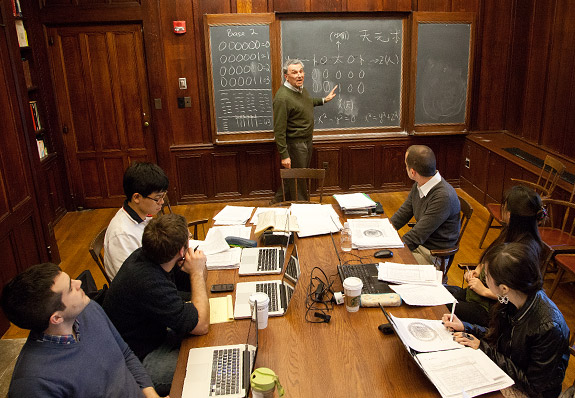Elman sparks regional-global approach to East Asian history
Posted May 14, 2012; 12:00 p.m.by Karin Dienst
http://www.princeton.edu/main/news/archive/S33/66/67I31/index.xml?section=featured
Princeton University scholar Benjamin Elman has studied the history of East Asia for most of his intellectual life. Instead of getting easier, it has become more complicated — which for him is a good thing.
Elman's ongoing interest is to re-examine our understanding of China and Japan by rethinking how the history of East Asia has been told, especially in the West, but also in China, Japan and Korea.
To do so, he and other scholars are paying particular attention to the early modern period in East Asia and India — around 1600 to 1800 — to understand key developments. For Elman, this endeavor is crucial because it focuses on a time when this part of the world had advanced in many spheres, before the so-called ascendancy of Europe as an economic and political power over the course of the 19th century.

Benjamin Elman, the Gordon Wu '58 Professor of Chinese Studies and professor of East Asian studies and history, focuses on re-examining how the history of East Asia has been told. He is pursuing this work through international collaborations, allowing for the possibility of a "shift in perspective" not only regarding the history of East Asia, but world history.
Elman, the Gordon Wu '58 Professor of Chinese Studies and professor of East Asian studies and history, argues that by shedding light on this period it is possible to have a "shift in perspective" not only regarding the history of East Asia but world history. One outcome of such a shift, Elman asserts, is that the West in particular would no longer find so "surprising" or "miraculous" the rise of China or India in the 21st century.
"What we're trying to do is change the narrative," Elman said. "It's not that it's a triumphal narrative for China, but it means in many ways that the global system is much more complicated than we thought it was. And Chinese and Indian success in the 21st century is not a miracle; it is due to longer-term economic, social and cultural developments that we need to study very carefully."

This semester, Elman is teaching a graduate class on medicine and mathematics in early modern East Asia. He is interested in showing how this part of the world had advanced in many spheres, before the so-called ascendancy of Europe as an economic and political power over the course of the 19th century. Here, Elman discusses the hexagrams in the ancient Chinese text "Yijing" ("Classic of Changes") and equates them with binary mathematics. (Photo by Denise Applewhite)
In telling this story, Elman has written and edited more than 10 books, which weave together history, philosophy, literature, religion, economics, politics and science. Many of the books have been translated into Chinese as well as Korean and Japanese.
Elman, who joined the Princeton faculty in 2002, emphasizes the pronoun "we" when he talks about pursuing this work. As a teacher and a scholar, who also has been chair of the Department of East Asian Studies for the past two years and before that director of the East Asian studies program, he works closely with Princeton students and faculty members.
Elman also has been very effective in building relationships with institutions in East